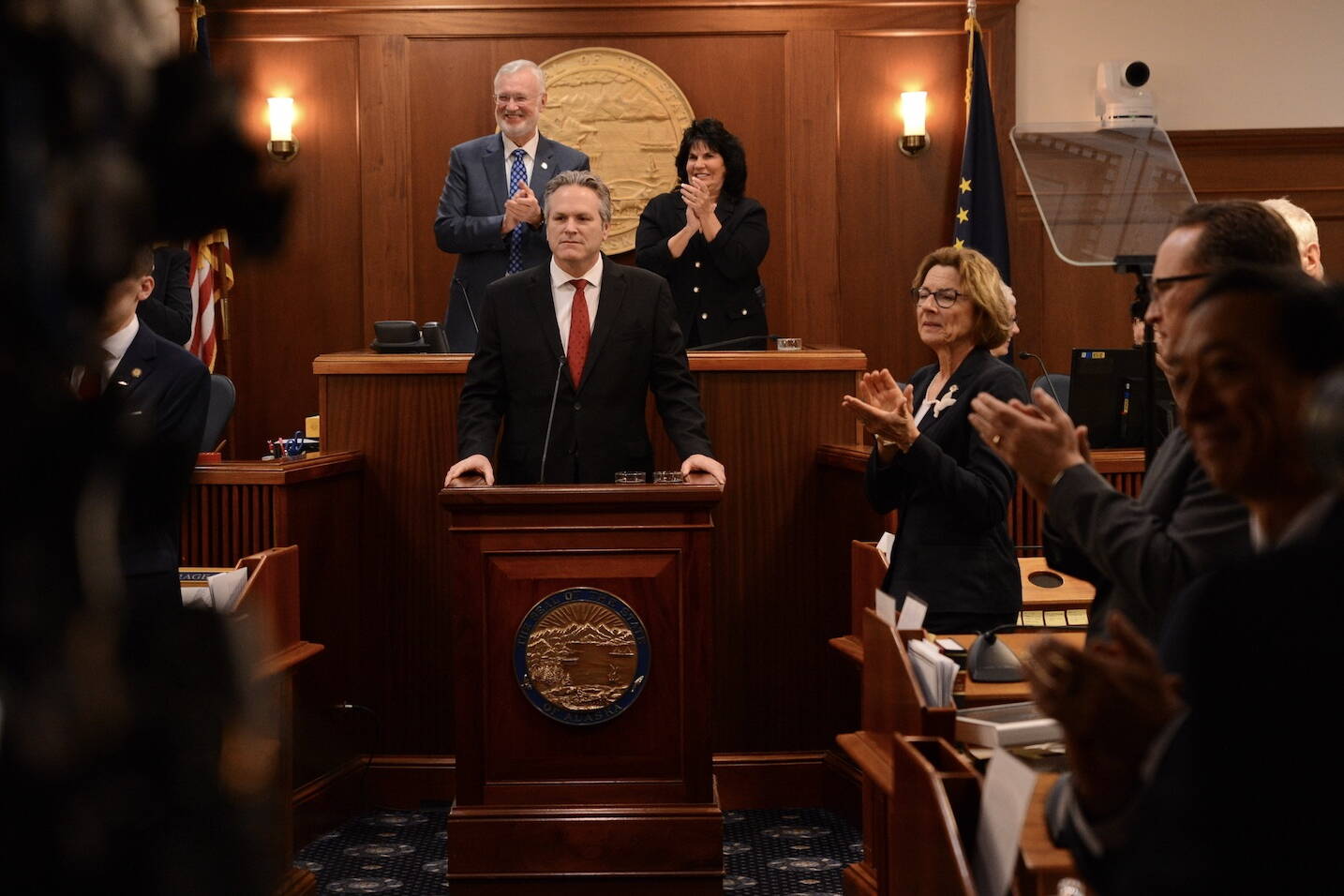In his sixth annual State of the State address, Alaska Gov. Mike Dunleavy promoted development projects, called on state lawmakers to advance his legislative priorities and said the state is in danger of falling behind others in economic growth.
“Too many in this state have gotten very good at saying ‘no.’ … No to mining. No to oil and gas. No to harvesting timber. No to renewables. No to growing more food. No to trucks on roads. No to roads, period. Unless we change this attitude, North to the Future will become ‘No’ to the Future,” the governor said.
During the 50-minute speech, the governor asked legislators to pass bills related to education, agriculture, home ownership, and the supply of natural gas for Southcentral Alaska.
“We’re in competition for people, and that’s why we’re proposing policies this year to make Alaska the best place to live, have a family, and do business,” Dunleavy said.
Dunleavy, who oversaw steep cuts to the University of Alaska budget during his first years in office, also asked for increased funding for the university and the Alaska Permanent Fund dividend; both requests were included in the budget he proposed to lawmakers in December.
That budget proposal included a $1 billion deficit that the governor suggested should be filled with spending from savings.
Legislators have previously opposed the idea of spending large amounts from savings in order to boost the dividend, and House Minority Leader Calvin Schrage, D-Anchorage, said that while he commended the governor’s speech for its aspirations, he was astonished that the governor didn’t mention the need for a state fiscal plan or address the fact that the administration’s own 10-year projections forecast a $10 billion deficit.
Members of the Senate majority and the House majority caucuses generally praised the speech and said nothing within it surprised them.
“I found a lot to agree with in what the governor had to say, when he talked about opportunity and North to the Future. I sure agree,” said Senate Majority Leader Cathy Giessel, R-Anchorage.
On education, the Alaska House of Representatives has thus far been unable to advance Senate Bill 140, a comprehensive education bill, in large part because many legislators believe it should include a larger increase to the state’s per-student funding formula, known as the base student allocation.
While Dunleavy never mentioned the bill by name, legislators said they heard him directly address the issue.
“For far too long, the drumbeat for more money in the BSA has drowned out nearly every other conversation,” the governor said.
He urged lawmakers to approve cash bonuses to teachers who stay in Alaska. That idea, introduced in legislation from the governor, has been included in SB 140.
Dunleavy also devoted a portion of the speech to celebrate the success rate of Alaska charter schools and invited Sheila Sweetsir, principal of Anchorage’s Alaska Native Cultural Charter School, to attend the speech as an example of their success. Within SB 140 are provisions that boost charter schools.
“You kind of see where the priorities lie,” said Rep. Craig Johnson, R-Anchorage and chair of the powerful House Rules Committee. “His particular portion is not everybody’s particular portion, as we’ve discussed before. But there’s something in (SB 140) for everyone.”
With Southcentral Alaska running out of available natural gas, the governor mentioned his proposal to reduce taxes and royalties on gas produced from Cook Inlet, an attempt to increase production. He also discussed state plans to improve electrical infrastructure between the Interior and Southcentral, allowing low-cost power to be more easily moved from where it’s created to where it’s used.
“Whether it’s coal, natural gas, advanced nuclear, or our abundant renewable resources, we must pursue every energy opportunity to secure affordable and sustainable supplies for Alaska,” he said.
Other governor-proposed bills mentioned Tuesday night included a proposal to reduce the down payments for first-time homeowners who seek loans from the Alaska Housing Finance Corp., and legislation that would reduce costs for farmers.
The speech, originally scheduled for Monday, was postponed by a day after high winds prevented many of the governor’s commissioners and First Lady Rose Dunleavy from flying to Juneau from Anchorage.
The governor made one extended departure from his prepared remarks as he spoke about the way the community of Wrangell pulled together after a devastating landslide killed six people.
When he was younger, Dunleavy said, people in his home state of Pennsylvania asked him why he kept returning to Alaska after visiting family.
“And really what the answer is, it’s because of the people. It’s because of the people of Alaska. It’s what makes us so different. And so, I want to thank you for everything you do,” he said.
James Brooks is a longtime Alaska reporter, having previously worked at the Anchorage Daily News, Juneau Empire, Kodiak Mirror and Fairbanks Daily News-Miner. This article originally appeared online at alaskabeacon.com. Alaska Beacon, an affiliate of States Newsroom, is an independent, nonpartisan news organization focused on connecting Alaskans to their state government.

